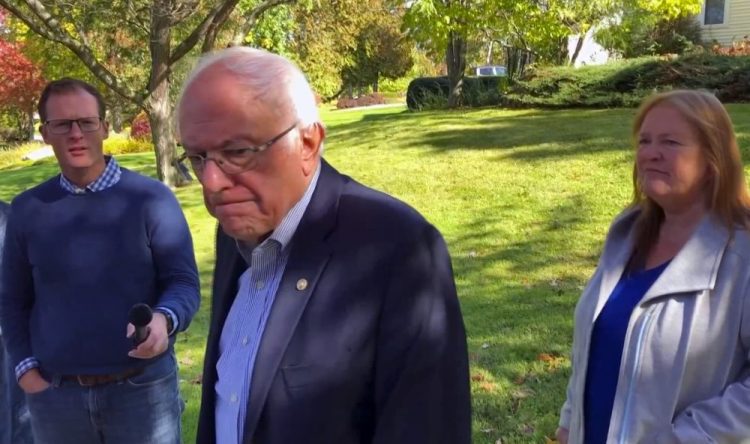Sen. Bernie Sanders, off the campaign trail and resting at home until next week’s Democratic debate, said Tuesday he had been “dumb” to ignore symptoms that might have foretold the heart attack he suffered a week ago and he urged others not to make the same mistake. He also admitted that he will have to reduce the number of campaign events he holds a day because of his health.
“During this campaign, I’ve been doing in some cases three or four rallies a day, running all over the state – Iowa, New Hampshire, wherever,” Sanders told reporters outside his home in Burlington, Vermont. “And yet I, in the last month or two, just was more fatigued than I usually have been. And I should have listened to those symptoms.”
Sanders visited a cardiologist Tuesday morning, and when he returned, he told reporters “We’re gonna change the nature of the campaign a bit.”
“Probably not doing four rallies a day,” said Sanders, who had adopted a more furious campaign schedule than many of his much-younger opponents.
Sanders, who has committed to releasing his medical records before the first primary votes but has not yet done so, said Tuesday he would provide the information at “the appropriate time.” Former vice president Joe Biden and Sen. Elizabeth Warren, D-Mass. – fellow septuagenarians who join Sanders at the top of most polls – have also committed to releasing their medical records.
Sanders met reporters outside his Burlington home where he has spent the last few days with family, making calls and recovering from a heart attack he suffered during a grass roots fundraising event in Las Vegas last week.
The 78-year-old felt chest pains last Tuesday night and was taken to a hospital where doctors inserted two stents into a blocked artery. By Monday, he was back in Burlington, taking a walk with his wife Jane and addressing his campaign on a staff-wide conference call.
The campaign had not initially disclosed that Sanders had suffered a heart attack, acknowledging at first only that the stents had been implanted. Tuesday’s remarks were the first in which Sanders himself has been so open about what happened.
The Vermont senator had been making more frequent campaign stops than almost any of his fellow Democrats, despite being the oldest candidate in the field. He had never spoken publicly about feeling increased fatigue, though it was clear he was maintaining a grueling pace.
Far from admitting he was tired, Sanders tried to demonstrate that despite his age he remained robust and vibrant. In late August, for example, he participated in a softball game with his campaign staffers in Iowa.
But he suffered occasional minor physical setbacks. Sanders cut his head on a shower door in the spring, and had to cancel a day of events when he lost his voice in September.
“If there’s any message that I hope we can get out there, it’s that I want people to pay attention to their symptoms,” Sanders said. “When you’re hurting, when you’re fatigued, when you have a pain in your chest – listen to it.”
Some Sanders advisers and supporters said they hoped Sanders would slow his campaigning pace somewhat, a wish that seems likely to be granted for at least the next few days. Campaign officials have signaled that Sanders will not hit the campaign trail again until next Tuesday’s debate.
Allies also say they hope Sanders will talk openly about his heart attack as a way to present a more human side, a departure for a candidate noticeably reluctant to talk about himself. In his remarks in recent days, as well as appearances with his wife, he seems to have begun that process.
In the meantime, the campaign has churned along even without campaign appearances by the candidate. On Monday, Sanders’ team rolled out a proposal to curtail the role of money in politics. On Tuesday, the campaign began airing $1.3 million in television ads in Iowa.
Later Tuesday, the Sanders team announced a series of endorsements from local officials in Nevada. And Rep. Ro Khanna, D-Calif., a Sanders campaign co-chair, tweeted that Sanders “had a great call” with his campaign co-chairs.
Sanders’ hiatus from the trail mean the Democratic debate in Ohio next week is likely to be a crucial moment for his campaign. He will have had 14 days of rest between his procedure and the debate, when voters and rivals are likely to scrutinize his performance for any signs of fatigue or additional physical strain.
Send questions/comments to the editors.



Success. Please wait for the page to reload. If the page does not reload within 5 seconds, please refresh the page.
Enter your email and password to access comments.
Hi, to comment on stories you must . This profile is in addition to your subscription and website login.
Already have a commenting profile? .
Invalid username/password.
Please check your email to confirm and complete your registration.
Only subscribers are eligible to post comments. Please subscribe or login first for digital access. Here’s why.
Use the form below to reset your password. When you've submitted your account email, we will send an email with a reset code.